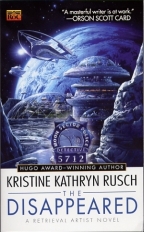The Disappeared
Kristine Kathryn Rusch
Roc/New American Library/Penguin Putnam
Mass Market Paperback
ISBN: 0-451-45888-5
Publication Date: July 2002
374 Pages; $6.50
Date Reviewed: June 26, 2003
Reviewed by: Terry D'Auray © 2003

REFERENCES
COLUMNS
|
|
|
The DisappearedKristine Kathryn RuschRoc/New American Library/Penguin PutnamMass Market PaperbackISBN: 0-451-45888-5Publication Date: July 2002374 Pages; $6.50Date Reviewed: June 26, 2003Reviewed by: Terry D'Auray © 2003 |
|
|
REFERENCES |
COLUMNS |
Science fiction and mystery are frequently paired, but to a self-professed mystery purist, rarely successfully. I began this book with skepticism, but I ended it with a hearty "not bad", which is, indeed, not bad from a reader who thinks science fiction is forgettable, far fetched fantasy and mysteries, at least the good ones, are gritty, utterly realistic and memorable.
'The Disappeared' is a science-fictionalized police procedural set in Armstrong, a colonized dome-covered city on the Moon. Police procedurals feature cops in the lead role, either singly or in teams, either helpmates or sparring partners. In 'The Disappeared' one type of team is transformed into the other. Noelle DeRicci is a crusty, rule-breaking female senior detective and Miles Flint, her newbie partner, is a former orbiting traffic cop promoted to detective at Armstrong's Port. She puts him down, he shows her up, they start out sparring partners and end up helpmates as they gingerly two-step toward personal justice and professional suicide.
Together Earthlings DeRicci and Flint investigate three different story lines, rooted in three different alien ideologies, to uncover the common thread. In one, human children are legally stolen from their parents by aliens as punishment for the parent's past wrong doings; acts committed well before the children were born. In the other, a San Francisco attorney fleeing punishment for a cross-cultural faux pas is forced to disappear or face certain death. The third features three victims of an apparent vengeance killing. One common thread is legalized - indeed sanctioned -- murder and injustice, which DeRicci and Flint, as cops, must condone and enforce to maintain treaties with extraterrestrial civilizations. The other, slowly revealed, is an intergalactic swindle by "Disappearance Inc." a company that specializes in selling high-priced disappearing acts to desperate wrong doers. The setting is a delicately balanced state of alien co-habitation between Earthlings, Wygnins, Revs and Distys, governed by multi-cultural agreements and interstellar laws that allow killings, abductions and brutality.
'The Disappeared' is more mystery than science fiction, more earth-biased than alien, but the SF elements give the standard police procedural an interesting twist. The bad guys are aliens and the bad deeds are alien ideological acts, often unacceptable to Earthlings, but respected and legally sanctioned. Rusch's full story unfolds in jump cuts from character to character, and from viewpoint to viewpoint. The victims, including an outlaw attorney or ill-fated parents tell some of the stories. Others are told by the two cops and their higher-ups, who include attorneys, translators and mediators. The only characters who don't speak directly are the aliens -- they are always described by humans, making them all the more alien.
Rusch's writing is strong, her dialogue is crisp and the pacing is faultless, fast but not frantic. Each story is fully told, each character is fully fleshed out (or, for the fleshless aliens, fully described) and the conflict couldn't be more clear if it was written on your forehead. She creates some strong, memorable female characters - Ekaterina, the outlaw attorney, DeRicci, and a wonderful wise-woman, Paloma, introduced near the end of the book. The female characters often outshine Flint, the hero who will anchor the second book in this series. All good mysteries invoke a sense of place and atmosphere, and Rusch does this expertly and often, describing the domed city Armstrong and other alien colonies with rich detail and haunting atmosphere. There's moderate violence, but none luridly described, no sex, and next to no profanity. This is a book approaching wholesome.
So why a "not bad" instead of "great"? It's that wholesomeness, along with minimal suspense and too much Earth bias, comfortable and more easily digested for sure, but somehow tame and unsatisfying. Extensive intergalactic legal wrangling, too many long walks down the long corridors of the Armstrong Port, too many mediators and translators, rob this story of tension. But I'm going to hang in there and read one more. The next book in the series features Flint working outside the law. Like the best mysteries, it holds forth the promise of more conflict, more edginess, and more grit.